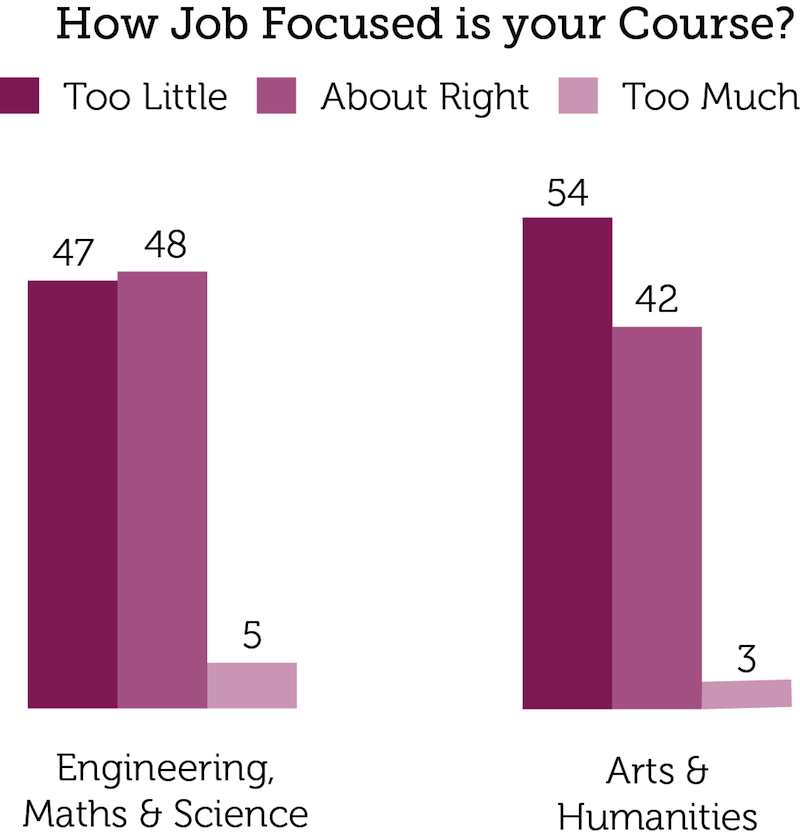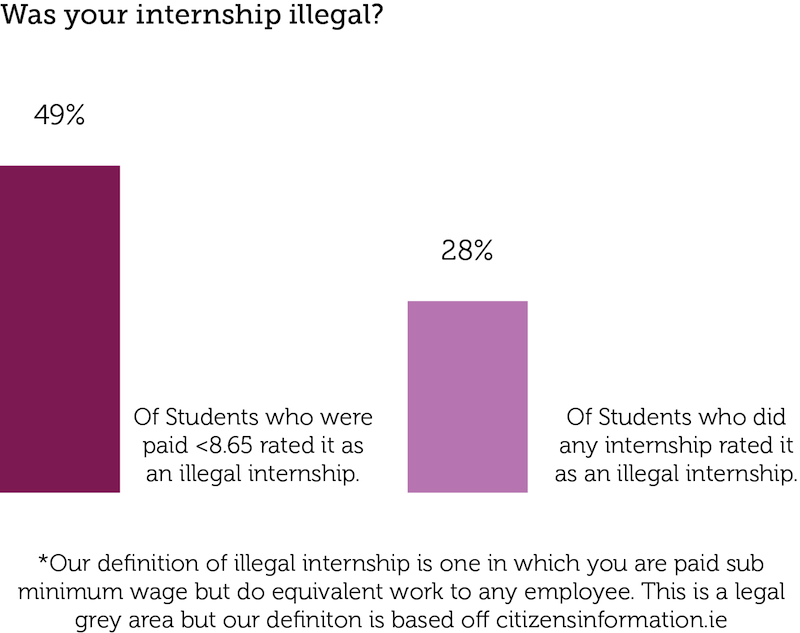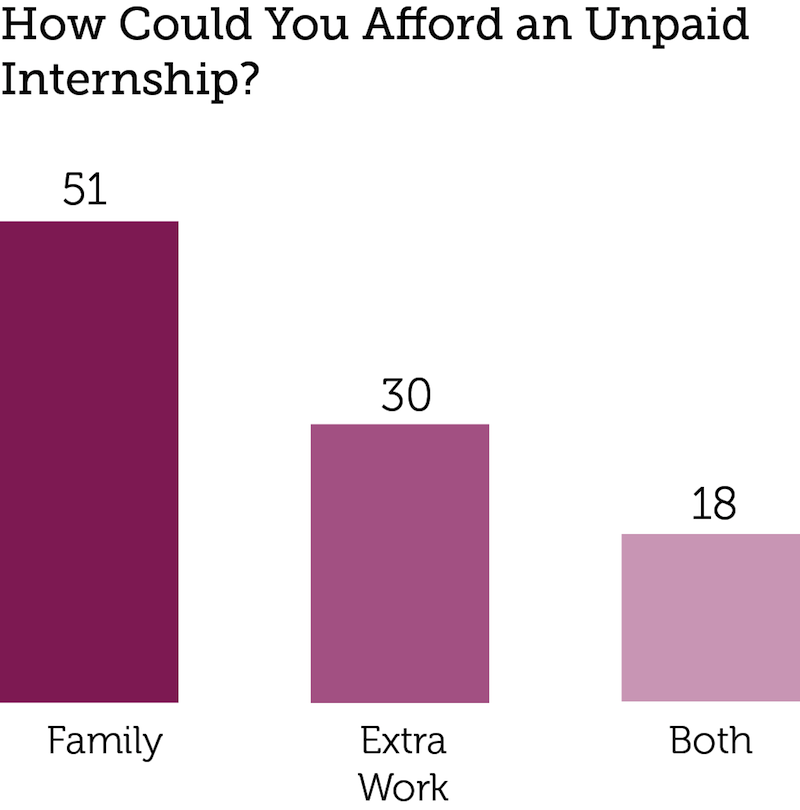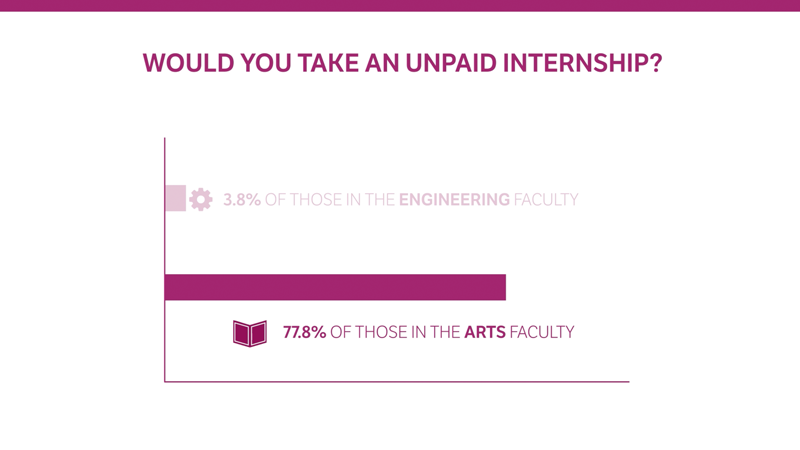Conor Murphy | Features Editor
Over the last two weeks The University Times conducted a survey of students in the Arts, Humanities and Social Sciences Faculty (hereby referred to as Arts and Humanities) and the Engineering, Mathematics and Science Faculty (hereby referred to as Engineering and Science). The survey covers the attitudes of Trinity students to their education, pay rates for internships they have undertaken and the expectations that students have for any internships they might take.
Education
First, let us start on a good note. A strong 92% of Trinity students surveyed would recommend their course to a friend. The faculty that the student is in has only a small significance: Engineering and Science has a two percentage point lead over Arts and Humanities in this regard.
A Note on Statistical Significance
Cheating is a question that also seems fairly independent of faculty. Although this is the most personal question on the list, it is also the question with the highest chance of being under-reported due to lying. UT found that 4.5% of all students surveyed said they had cheated on a state or college exam. There was a small margin of difference between faculties but given the small number of people who said yes to this the difference is insignificant.

In reference to how job focused their course is, half of all students thought their course was not job-focused enough. This sense is a little bit stronger in Arts and Humanities, with an 8 percent difference at 54 vs 47 for Engineering and the Sciences. The “Too much job focus” was at 5% in the Engineering Faculty and 3 in the Arts Faculty – absolutely minimal in both. This is interesting in light of College plans to introduce more entrepreneurship and work experience opportunities into courses.
Internships
As one would expect, Engineering and Sciences has a higher percentage of people who took an internship at some point, at 42% compared to 29% for Arts and Humanities. However, for internships, Engineering and the Sciences rate the quality of their work more highly and get paid more while expecting vastly better pay from their placements.
For the internships that students have already undertaken 7.8% of Engineers were unpaid compared to 36.8% of Arts students. If you counted all pay under minimum wage, including the rate of pay of zero euro per hour, then it levels out a bit more, with 52.6% of Engineering and Sciences in this category and 63% of Arts in this category. The inverse is then that half of the Engineering faculty get paid at least minimum wage for their internships, which is obviously a significantly higher number than that in Arts and Humanities, which is at 37%.
One explanation for this is how well Engineers rate their work. 67.4% of Engineering and Sciences rate their work in internships as being at least partially of the quality/effort of a full time employee while 44% of Arts students rate theirs as of that level.

Highly noteworthy is that, legally, internships that are roughly equivalent to any full time employee should be paid at least minimum wage. Using this standard, 49% of internships that pay less than minimum wage are probably illegal (noting that they rated their own work). These numbers mean that 28.7% of all students who took an internship took up an internship that was probably illegal.
Privilege through Internships

It’s important to note the privilege that is inherent in this system. Any industry that is based on unpaid internships will automatically be a system that filters out more working-class people. This system is kept alive by the strong acceptance by students that unpaid internships are a fair or necessary thing in their respective industry. The most striking difference in this whole survey is in the answers to this question. Only 3.8% of Engineering and Science students say they would take an unpaid internship but an incredible 77.3% of Arts and Humanities students say they would – twenty times differential.
In relation to how people could be able to take an internship that doesn’t pay well, it inevitably shows that a lot of students would rely on their family. 69.4% of people who would take an unpaid internship would need some family support to get through a three month internship. 51% would be relying on their family completely.
These results show the hold that a culture of internship has over students, in particular those that study Arts and Humanities. That so many students would be willing to undertake an internship that is likely to be illegal is an interesting reflection on what students feel they need to do to further their career. However in light of increasing College rhetoric around increasing the employability of students, it is important to note that most students are currently happy with their courses and half think that their courses emphasis on getting a job is about right.
Survey Carried out by Sinéad Baker, Sarah Galvin, Julia McConway, Charlotte Ryan, Carl Kinsella, Conor Murphy







